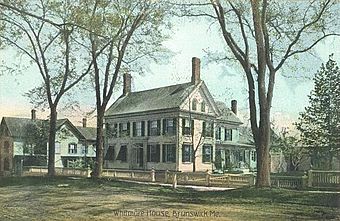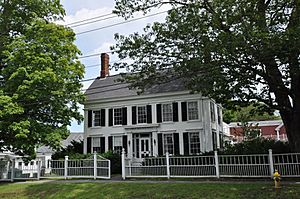Harriet Beecher Stowe House (Brunswick, Maine) facts for kids
|
Harriet Beecher Stowe House
|
|
|
U.S. Historic district
Contributing property |
|
 |
|
| Location | Brunswick, Maine |
|---|---|
| Built | 1850 |
| Architectural style | Greek Revival |
| Part of | Federal Street Historic District (ID76000092) |
| NRHP reference No. | 66000091 |
Quick facts for kids Significant dates |
|
| Added to NRHP | October 15, 1966 |
| Designated NHL | December 29, 1962 |
| Designated CP | October 29, 1976 |
The Harriet Beecher Stowe House is a special old home in Brunswick, Maine. It's famous because Harriet Beecher Stowe lived here for a short time. While she was here, she wrote her very important book, Uncle Tom's Cabin, in 1852. Before her, the famous poet Henry Wadsworth Longfellow also lived in this house when he was a student. Today, Bowdoin College owns the house. You can even visit a part of it called Harriet's Writing Room!
Contents
A Home with History
This house was built a long time ago, between 1806 and 1807. It was first known as the Titcomb House. Henry Wadsworth Longfellow and his brother Stephen rented rooms here. They were students at nearby Bowdoin College in the early 1820s.
Harriet Stowe Moves In
In 1850, Calvin Ellis Stowe became a professor at Bowdoin College. He and his family decided to rent this house. His wife, Harriet Beecher Stowe, arrived first to get the house ready. She traveled in April 1850 with three of their children and her aunt. Harriet was also six months pregnant at the time.
They arrived in Brunswick on May 22, during a storm. The house was partly ready thanks to Phebe Upham, a professor's wife. Harriet wrote to her husband, saying Mrs. Upham helped them a lot. She felt lonely without her husband, writing that the "rattletrap house" made many noises at night.
A New Baby and a Famous Book
Harriet's youngest son, Charley Stowe, was born in this house on July 8, 1850. She was writing when he arrived. She joked that she had to stop writing to take care of "some other affairs." She said the baby was a "great beauty" with "excellent lungs."
Once settled, Harriet wrote for different magazines. The rent for the house was $125, which was more than they expected. Harriet wrote to help pay for it. It was also here that she wrote her famous story, Uncle Tom's Cabin. This story was first published in parts, like a TV show today.
The idea for Uncle Tom's Cabin came to her in a vision. She was sitting in a church pew nearby. She imagined the character Uncle Tom being badly beaten. She even read early parts of her book to friends. These friends included Joshua Chamberlain, who later became president of Bowdoin College.
Helping Others on the Underground Railroad
While living here, the Stowes also helped people escape slavery. They supported the Underground Railroad. This was a secret network that helped enslaved people find freedom. John Andrew Jackson, a person who had escaped slavery, stayed with the Stowe family. He wrote about hiding with them on his way to Canada.
The Stowes only lived in this house for two years. But Harriet later said these were the healthiest and happiest years of her life.
The House Today
Over time, the house changed. It became a restaurant and a hotel for a while. In 1962, it was named a National Historic Landmark. This means it's a very important historical place. It was also added to the National Register of Historic Places in 1966.
In 2016, it was recognized as a site on the National Underground Railroad Network to Freedom. This highlights its role in helping people escape slavery. Bowdoin College bought the house in 2001. They still own it today. In May 2016, the college opened Harriet's Writing Room to the public. Most of the outside of the house looks just like it did when the Stowes lived there.
 | Selma Burke |
 | Pauline Powell Burns |
 | Frederick J. Brown |
 | Robert Blackburn |




